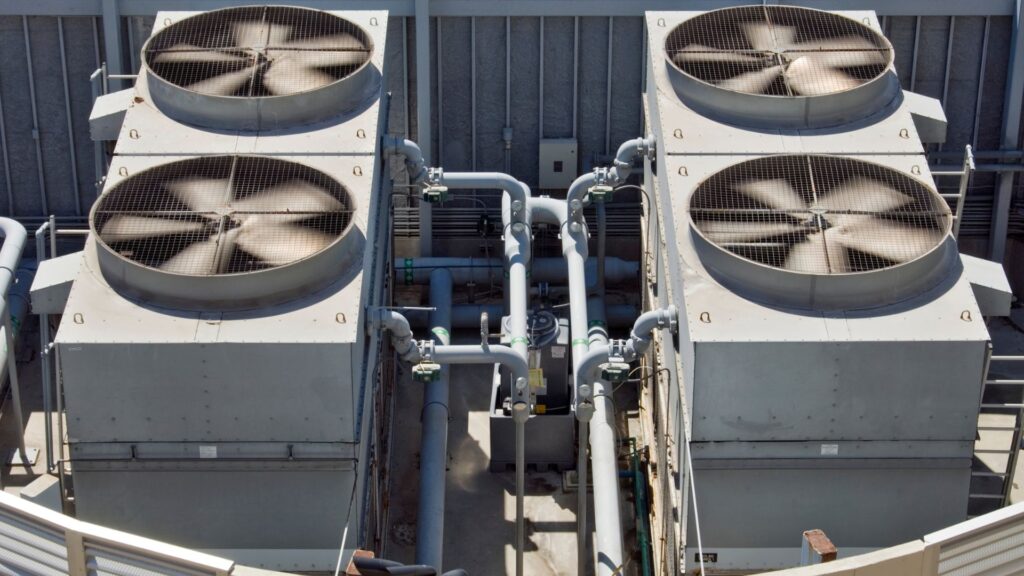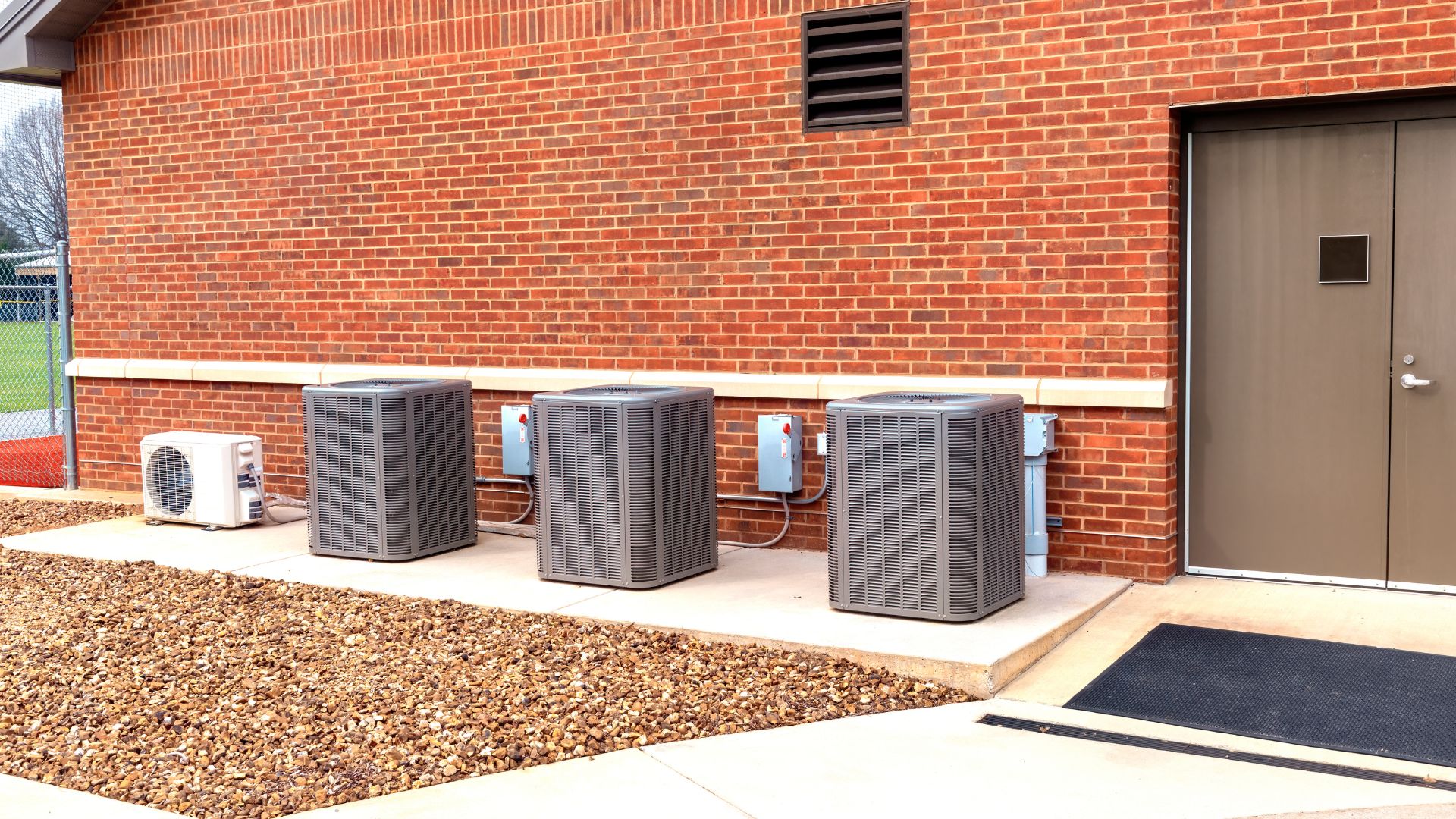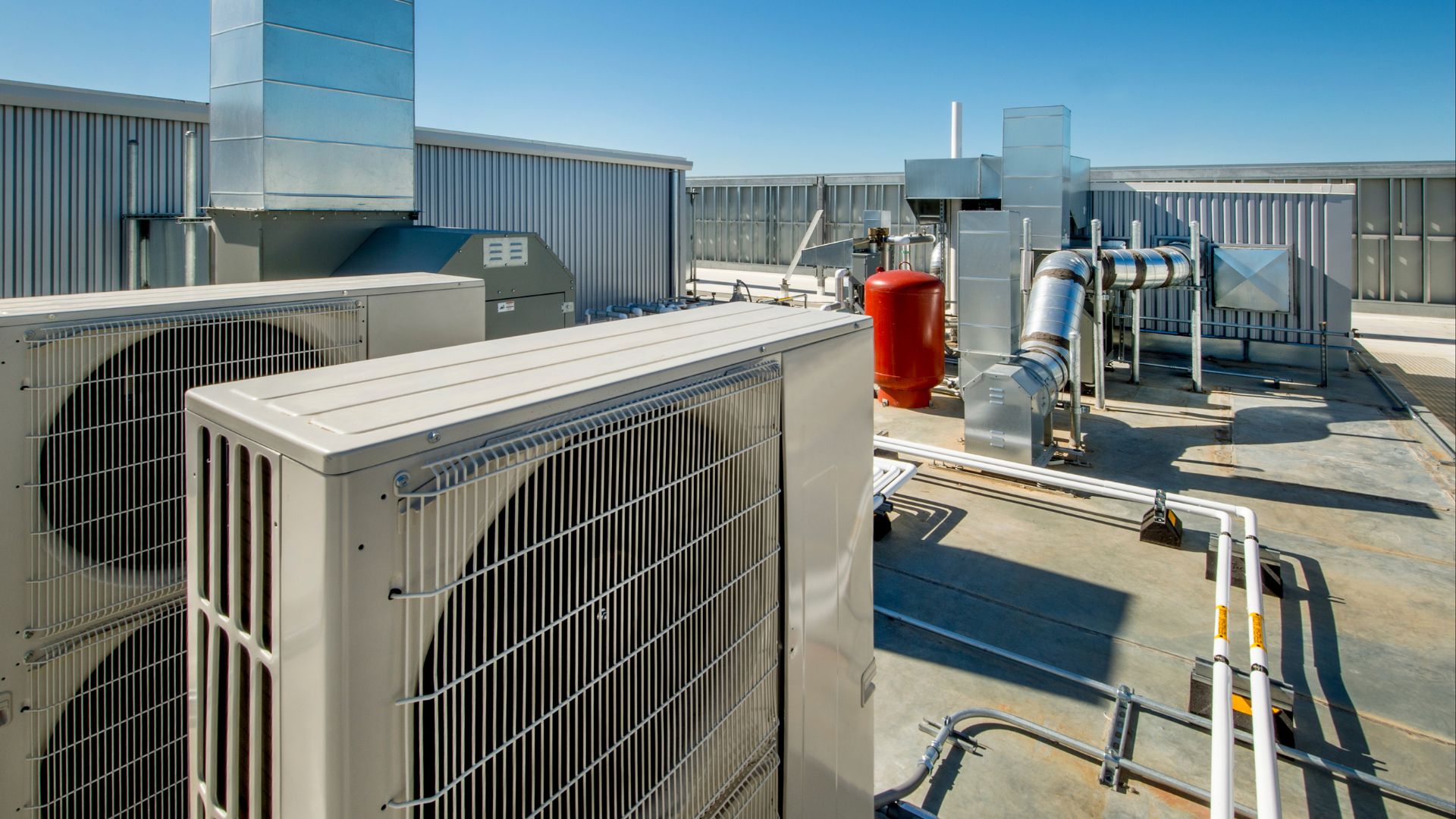People spend so much time indoors that concerns about indoor air quality (IAQ) have grown in importance. Ill health, discomfort, and decreased productivity are only some of the results of inadequate indoor air quality (IAQ). HVAC systems are essential to managing IAQ and producing a healthy, comfortable indoor environment.
This article digs into the substantial impact of HVAC systems on indoor air quality (IAQ) and human health, highlighting how important it is to have systems that are correctly designed, regularly maintained and run efficiently.
The Role of HVAC Systems in Indoor Air Quality
Having a well-maintained HVAC system is essential for high IAQ. The purpose of HVAC systems is to improve indoor comfort. To function, they bring in outside air, filter it, and then send it to every room in the building.
Air pollutants can be successfully removed from the air when the HVAC system is properly suited for the building. IAQ is also improved because mould and mildew growth is inhibited by the system's ability to regulate humidity levels.
However, problems with the HVAC system might impact indoor air quality (IAQ). If the system is bigger, for instance, it may not be able to filter out pollutants or deliver enough fresh air. This can cause contaminants like dust, pollen, and VOCs to accumulate, which is bad for the health of anyone living there.
Maintaining your HVAC system regularly is crucial to keeping it running efficiently. Dust and debris in the system are removed during routine inspections and cleaning. To keep the air circulated clean and impurities-free, the filters must be frequently replaced to prevent clogging.
The Effect of HVAC Maintenance on Indoor Air Quality
Maintaining your HVAC system regularly is essential for good indoor air quality. Lack of maintenance in HVAC systems allows mould, bacteria, and other impurities to grow. Unclean or clogged filers can also reduce the system's efficiency at filtering the air and removing contaminants.
Cleaning or changing filters, checking and cleaning ductwork, and performing routine system performance checks are all part of a well-maintained HVAC system. Regular HVAC cleaning and maintenance reduces IAQ risk.
In addition to routine upkeep, treating any faults or problems as soon as they are noticed is crucial. To stop the mould from spreading further and contaminating further areas, the system must be remedied as soon as possible if there are any signs of mould or excessive moisture. Repairing air leaks or circulation problems is also essential for optimal system performance.
The owners, managers, and tenants can help keep the air quality high and healthy by prioritising HVAC maintenance. In addition to enhancing indoor air quality (IAQ), routine maintenance also lengthens the life of the HVAC system and decreases energy usage.
Removal of Contaminants
Indoor air quality is protected by HVAC systems, which efficiently filter out potentially dangerous airborne pollutants. Dust, pollen, pet dander, mould spores, and other airborne allergens can worsen asthma and other respiratory problems. HVAC filters capture and remove small particles, including HEPA filters, improving IAQ and lowering allergy symptoms.
Limiting the Release of Volatile Organic Compounds
Construction materials, household furnishings, cleaning supplies, cosmetics, and toiletries can all be volatile organic compounds (VOCs) sources. Irritation of the respiratory tract, headaches, and even long-term health hazards are just some of the negative impacts that these substances can have on human beings.
Activated carbon filters and photocatalytic oxidation are two examples of air purification technologies that can be integrated into HVAC systems to remove VOCs from the air. Heating, ventilation, and air conditioning systems improve indoor air quality by lowering VOC concentrations.
Maintaining a Comfortable Temperature
In addition to indoor air quality, another important factor affecting people's health and productivity is the temperature in a given space. Extreme heat or cold can cause discomfort, tiredness, cognitive impairment, and illness. HVAC systems actively manage indoor temperatures to optimise occupant health and productivity.
HVAC systems' relevance to building occupants' health and comfort cannot be overstated. HVAC systems that are well-designed, maintained, and energy-efficient are the first line of defence against environmental dangers.
IAQ, occupant health, productivity, and happiness can improve a building's HVAC. High-quality HVAC systems and regular maintenance are essential for a sustainable living and healthy working environment as IAQ awareness grows.
Indoor Air Quality and HVAC Systems
Air Filters
Air filters are a major factor in how HVAC systems affect interior air quality. These filters capture debris like dust and dirt so they can't float in the air. These filters, however, can become clogged with time, diminishing their efficiency. To keep them functional, air filters must be routinely replaced.
Humidity Control
Humidity regulation is another important function of HVAC systems. Low humidity can cause dry skin, respiratory troubles, and other health problems, while high humidity promotes mould and mildew. Humidity levels should be about 30 to 50 per cent, and HVAC systems can help.
Ventilation
Indoor air quality relies on many factors, not the least of which is adequate ventilation. A building's HVAC system can assist in keeping the air circulating, which reduces the likelihood that pollution and other contaminants would accumulate. Ensure your HVAC system is fitted and sized correctly to guarantee sufficient airflow.
Carbon Monoxide and Other Gases
When not maintained correctly, heating, ventilation, and air conditioning (HVAC) systems can release toxic gases like carbon monoxide into the atmosphere. Carbon monoxide is a silent killer, but it's hard to spot without a special detector. Regular inspections of your HVAC system are recommended to check for the presence of any potentially dangerous gases.
VOCs
Cleaning goods, furniture, and construction materials emit VOCs into the air. Although HVAC systems can assist in removing some of these pollutants, it is best to limit their use in the first place for everyone's health.
Methods for Enhancing the Quality of Indoor Air
Schedule Frequent Filter Replacements
As was previously noted, air filters play a crucial role in climate control. To keep them functional, air filters must be routinely replaced. This has the potential to enhance indoor air quality by decreasing the levels of airborne dust, grime, and other contaminants.
Keep the Relative Humidity Up
Maintaining correct humidity levels is vital for healthy indoor air quality. The ideal relative humidity is 30–50%. Mould and mildew growth can be stopped, lowering the risk of additional respiratory and general health disorders.
Use a HEPA Filter
To keep your home free of allergens like pollen, dust, and pet dander, invest in a high-efficiency particulate air (HEPA) filter. Your home's HVAC system can make a substantial contribution to the improvement of the air quality within your home if it is equipped with a HEPA filter.
Install a Carbon Monoxide Detector
Deadly carbon monoxide can build up in a room without anybody seeing it. Early carbon monoxide detection can save lives, so all homes and businesses should have them.
Use Natural Cleaning Products
Many cleaning products' volatile organic compounds (VOCs) can harm indoor air quality. If you want to improve the air quality within your home, switching to natural cleaning products can assist.
In conclusion, HVAC systems unquestionably affect interior air quality. HVAC systems serve a significant role in preserving the air quality, which is essential to our health and welfare. HVAC systems can increase or decrease indoor air pollution depending on their use and maintenance.
HVAC systems only work as well as their upkeep, air filter changes, and humidity management. Ventilation is also important for indoor air quality, and HVAC systems can help.
Not only may carbon monoxide be produced by poorly maintained HVAC systems, but also other dangerous gases. It is possible to prevent HVAC systems from releasing dangerous gases by maintaining them and regularly inspecting them.
Last but not least, in addition to keeping HVAC systems in good working order, individuals can take action to improve the quality of the air within their homes. Better indoor air quality can be achieved by using natural cleaning solutions and reducing VOC emissions.
Impact of Airborne Contaminants on Indoor Air Quality
Pollutants in the air are a major cause of subpar indoor air quality (IAQ). Particles of dust and pollen, mould spores and volatile organic compounds are some examples of these contaminants. Outdoor air, cleaning products, construction materials, and people contribute to their facility introduction.
Indoor air pollution is a serious problem since it can affect people's health and quality of life. From the mild discomfort of sneezing and coughing to the severe respiratory issues of asthma attacks and respiratory infections, they can produce a wide range of health impacts. These pollutants are especially harmful to allergy and respiratory sufferers.
IAQ problems caused by airborne pollutants can be reduced with well-designed ventilation systems. Adequate ventilation guarantees that fresh external air is continuously delivered into the internal environment, diluting and eliminating pollutants. It aids in moisture management, stopping the proliferation of mould and mildew that can release extra pollutants into the air.
Air filtration and ventilation improve indoor air quality. Small particles, such as allergies and pollution, might be difficult to filter out, but HEPA filters can. When combined with effective ventilation, these filters can dramatically affect indoor air quality.
The Importance of Ventilation Systems
Maintaining high indoor air quality (IAQ) requires careful attention to ventilation. Pollutants, excess moisture, and stale indoor air can all be reduced or eliminated with proper ventilation. It's crucial because it keeps indoor air fresh and helps dilute and eliminate contaminants that have built up.
Buildings can use a variety of ventilation systems. Air circulation between the inside and exterior of a building is accomplished through apertures like windows and doors in natural ventilation systems. Ventilation is achieved by using the natural wind and temperature differentials in the environment.
On the other hand, mechanical ventilation uses devices like fans, ducts, and vents to accomplish the same goals. When natural ventilation is inadequate, as in sealed-window buildings or places with high levels of external pollution, an artificial ventilation system can greatly help.
To achieve optimal indoor air quality (IAQ), it may be necessary to combine natural and mechanical ventilation. This hybrid solution combines mechanical system control and natural ventilation benefits like fresh outdoor air.
Conclusion
As poor IAQ has been linked to illnesses, discomfort, and lost productivity, it must be addressed. By bringing in outside air, purifying it, and distributing it to every room in a structure, HVAC systems play a critical role in keeping indoor air quality high. When installed correctly, HVAC systems may efficiently remove air pollutants and prevent the growth of mould and mildew, consequently enhancing indoor air quality (IAQ).
However, HVAC problems, such as a more extensive system's inability to filter out contaminants or supply enough fresh air, can affect indoor air quality. A well-maintained HVAC system decreases indoor air quality (IAQ) risks and avoids the formation of mould, bacteria, and other contaminants through regular maintenance.
Regular cleaning, inspection of the ducting, and performance checks are all part of HVAC maintenance. It is also crucial to address issues as soon as they are discovered. Prioritising HVAC maintenance not only boosts IAQ but also prolongs the system's life and decreases energy usage.
Also, allergens like dust, pollen, pet dander, and mould spores, which can aggravate asthma and other respiratory issues, are effectively filtered out by HVAC systems. They also aid in reducing VOC emissions, which can cause shortness of breath, headaches, and other health problems over time.
HVAC systems manage indoor temperatures in addition to IAQ, assuring occupant health and productivity. Sustainable living and a healthy workplace cannot be achieved without high-quality HVAC systems and routine maintenance.
Poorly maintained HVAC systems can produce harmful chemicals like carbon monoxide and volatile organic compounds (VOCs) despite their critical role in preserving healthy indoor air.
Potential hazards should be inspected regularly. Improve the air quality at home by replacing air filters regularly, keeping humidity levels at healthy levels, using a high-efficiency particulate air (HEPA) filter, monitoring for carbon monoxide, and cleaning with all-natural products.
Airborne pollutants like dust, pollen, mould spores, and volatile chemical compounds cause poor IAQ. Fresh outdoor air, dilution and elimination of pollutants, and prevention of mould and mildew growth are ways well-functioning ventilation systems can improve indoor air quality. Indoor air quality can be vastly enhanced by installing air filtering systems and increasing ventilation.
Both natural ventilation (through wind and temperature differentials) and artificial ventilation (with fans, ducts, and vents) can be used in buildings. When natural ventilation is insufficient, artificial ventilation can be used. Natural and mechanical ventilation can attain the best indoor air quality (IAQ).
In conclusion, HVAC systems are crucial in maintaining indoor air quality, but regular maintenance and ventilation are essential for maintaining a healthy indoor environment.
Content Summary
- Climate control has a major impact on the health of building occupants.
- These systems are indispensable for effective IAQ management and a pleasant, healthy interior.
- HVAC systems enhance IAQ by filtering outside air before redistributing it inside the structure.
- Properly installed HVAC systems are a must for improving indoor air quality (IAQ) by removing air pollutants and stopping mould growth.
- Contaminants like dust and pollen may build up if the HVAC system malfunctions.
- Improving indoor air quality (IAQ) and keeping HVAC systems running smoothly requires regular maintenance.
- In addition to lowering system efficiency, dirty filters can also increase levels of indoor air pollution.
- Mould growth is halted, and peak performance is preserved when HVAC systems are regularly maintained.
- High indoor air quality, prolonged system life, and less energy use are all benefits of prioritising HVAC maintenance.
- HVAC filters enhance IAQ and mitigate allergy symptoms by trapping and eliminating allergens.
- The emission of VOCs can be reduced with the use of HVAC systems.
- Heating, ventilation, and air conditioning (HVAC) systems impact well-being and productivity.
- Well-designed, maintained, and energy-efficient HVAC systems are critical for IAQ.
- Maintaining a comfortable indoor temperature and humidity is essential to a healthy green home or office.
- IAQ requires regular maintenance, including replacing HVAC filters that trap dust and debris.
- Mechanical ventilation and air conditioning (HVAC) systems maintain safe humidity levels.
- Indoor air quality (IAQ) may be maintained, and pollution can be reduced with well-designed ventilation systems.
- Poorly maintained HVAC systems could release carbon monoxide and other poisonous gases.
- Indoor air quality can be affected by cleaning products' volatile organic compound (VOC) emissions.
- By removing impurities from the air, filters increase indoor air quality.
- Mould and associated health problems can be avoided by keeping humidity levels where they should be.
- By trapping and destroying allergens, HEPA filters in HVAC systems help make the air we breathe healthier.
- Detectors for carbon monoxide and other potentially harmful gases are essential for early warning.
- Natural cleaning products help in improving indoor air quality by minimising VOC emissions.
- Maintenance, air filter replacements, and humidity regulation are essential to the continued functionality of HVAC systems.
- Dangerous gases can be contained within HVAC systems if they are regularly inspected.
- Natural cleaning products and lowering VOC emissions are two ways individuals can help improve IAQ.
- Indoor air quality is impacted by airborne particles such as dust, pollen, and volatile organic compounds.
- From minor discomfort to serious respiratory difficulties, these contaminants must be avoided at all costs.
- Improving indoor air quality (IAQ) through proper ventilation.
- Proper air circulation helps control humidity, which cuts down on mould growth.
- Eliminating pollutants and allergens from the air is a major factor in improving indoor air quality (IAQ).
- Pollutants can be reduced, and clean air can be kept inside with the help of ventilation.
- Both natural and artificial ventilation systems maintain a healthy interior air quality.
- Natural and mechanical ventilation provides the best indoor air quality (IAQ).
- Ventilation is crucial to maintaining high indoor air quality (IAQ) by eliminating pollutants and excess moisture.
- Ventilation systems in buildings get rid of stale air and impurities.
- Using the wind and temperature differences, natural ventilation employs windows and doors to move air.
- Employing fans and ducts, mechanical ventilation assists when natural ventilation is insufficient.
- A ventilation system that combines natural and mechanical methods improves indoor air quality by regulating airflow and drawing in external air.
Frequently Asked Questions
Regular maintenance, including filter changes, duct cleaning, system inspections, high-efficiency filters, and proper ventilation, significantly improve indoor air quality.
Well-maintained HVAC systems can alleviate symptoms for those with respiratory issues by reducing airborne irritants, but poorly maintained systems can worsen symptoms by circulating pollutants.
Yes, newer HVAC systems often come equipped with advanced filtration and ventilation features designed to improve air quality, making upgrades beneficial for indoor environments.
HVAC systems with high-quality filters can effectively capture allergens, dust, smoke particles, volatile organic compounds (VOCs), and other pollutants, thereby improving air quality.
Occupants can contribute by regularly changing filters, keeping vents unobstructed, ensuring proper ventilation, and scheduling routine HVAC maintenance to support better indoor air quality.



